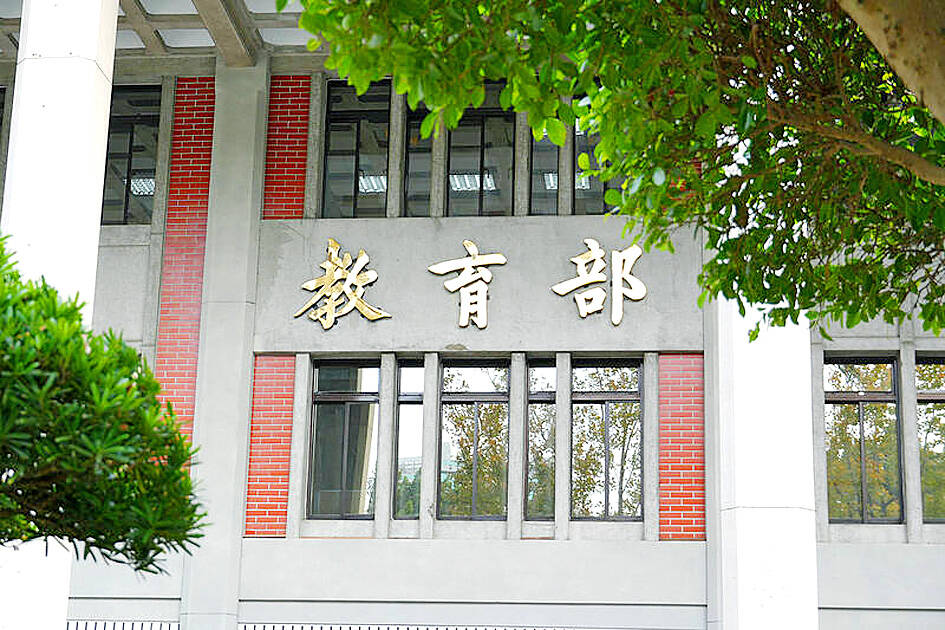The government has unveiled a NT$19.13 billion (US$647.84 million) subsidy package for universities this year, in response to growing concerns about the impact of population aging on the education sector.
This year’s allocation is an increase of NT$568 million compared with the higher education subsidies last year.
Part of the subsidies comes from the Ministry of Education’s (MOE) ongoing Higher Education Cultivation Project, Department of Higher Education Director-General Liao Kao-hsien (廖高賢) said on Tuesday last week.

Photo: Rachel Lin, Taipei Times
The current phase of the project, which runs from 2023 to 2027, aims to improve the quality and accessibility of education while enhancing the global rankings of Taiwanese universities, he said.
National Taiwan University received NT$2.63 billion, the largest amount awarded to a Taiwan university, an increase of NT$32.64 million from last year.
National Sun Yat-sen University received NT$616.94 million, up NT$198.1 million from the previous year, while National Chung Hsing University was allocated NT$546.56 million, an increase of NT$85.72 million.
National Yang Ming Chiao Tung University received NT$1.44 billion, an increase of NT$66.52 million from last year, while National Tsing Hua University also received NT$1.44 billion, with the same NT$66.52 million rise. The four universities received the largest increases in government subsidies.
National Cheng Kung University received NT$1.5 billion, up NT$25.78 million from the previous year, and National Central University was allocated NT$464.35 million, an increase of NT$37.67 million.
The National Taiwan University of Science and Technology received NT$45.07 billion, the largest amount among the nation’s vocational universities.
The first part of the project was allocated NT$12.36 billion, which includes NT$2.45 billion aimed at strengthening academia’s ties with local communities and facilitating the enrollment of students from disadvantaged backgrounds or of indigenous descent, Liao said.
The second part of the project was budgeted NT$6.77 billion, including NT$4.86 billion for schools to use at their discretion and NT$1.88 billion to specific departments or research centers, he said.
Last year, 10 research centers at National Taiwan University received NT$45 million in government subsidies under separate programs managed by the MOE and the Ministry of Science and Technology, university president Chen Wen-chang (陳文章) reported.
Recent government policy changes shifted the responsibility for funding these research centers to the MOE, whose budget has yet to be approved by the legislature, he said.
Taiwanese higher education institutions need about NT$20 billion of subsidies this year if the nation wishes to strengthen the educational system and retain academic talent, he said, urging lawmakers to support universities.
In agreement, National Central University president Hsiau Shu-san (蕭述三) said that the government should provide greater support to Taiwanese universities, which face increasing competition from foreign institutions.

Taiwan has received more than US$70 million in royalties as of the end of last year from developing the F-16V jet as countries worldwide purchase or upgrade to this popular model, government and military officials said on Saturday. Taiwan funded the development of the F-16V jet and ended up the sole investor as other countries withdrew from the program. Now the F-16V is increasingly popular and countries must pay Taiwan a percentage in royalties when they purchase new F-16V aircraft or upgrade older F-16 models. The next five years are expected to be the peak for these royalties, with Taiwan potentially earning

STAY IN YOUR LANE: As the US and Israel attack Iran, the ministry has warned China not to overstep by including Taiwanese citizens in its evacuation orders The Ministry of Foreign Affairs (MOFA) yesterday rebuked a statement by China’s embassy in Israel that it would evacuate Taiwanese holders of Chinese travel documents from Israel amid the latter’s escalating conflict with Iran. Tensions have risen across the Middle East in the wake of US and Israeli airstrikes on Iran beginning Saturday. China subsequently issued an evacuation notice for its citizens. In a news release, the Chinese embassy in Israel said holders of “Taiwan compatriot permits (台胞證)” issued to Taiwanese nationals by Chinese authorities for travel to China — could register for evacuation to Egypt. In Taipei, the ministry yesterday said Taiwan

‘LIKE-MINDED PARTNER’: Tako van Popta said it would be inappropriate to delay signing the deal with Taiwan because of China, adding he would promote the issue Canadian senators have stressed Taiwan’s importance for international trade and expressed enthusiasm for ensuring the Taiwan-Canada trade cooperation framework agreement is implemented this year. Representative to Canada Harry Tseng (曾厚仁) in an interview with the Central News Agency (CNA) said he was increasingly uneasy about Ottawa’s delays in signing the agreement, especially as Ottawa has warmed toward Beijing. There are “no negotiations left. Not only [is it] initialed, we have three versions of the text ready: English, French and Mandarin,” Tseng said. “That tells you how close we are to the final signature.” Tseng said that he hoped Canadian Prime Minister Mark Carney

POSITIVE DEVELOPMENT: Japan and the US are expected to hold in-depth discussions on Taiwan-related issues during the meeting next month, Japanese sources said The holding of a Japan-US leaders’ meeting ahead of US President Donald Trump’s visit to China is positive news for Taiwan, former Japan-Taiwan Exchange Association representative Hiroyasu Izumi said yesterday. After the Liberal Democratic Party’s landslide victory in Japan’s House of Representatives election, Japanese Prime Minister Sanae Takaichi is scheduled to visit the US next month, where she is to meet with Trump ahead of the US president’s planned visit to China from March 31 to April 2 for a meeting with Chinese President Xi Jinping (習近平). Japan and the US are expected to hold in-depth discussions on Taiwan-related issues during the